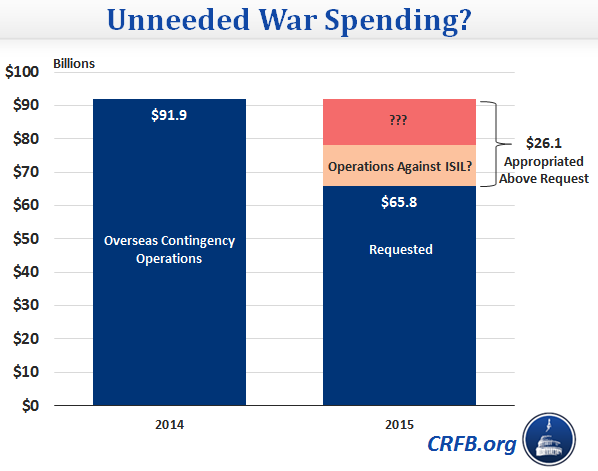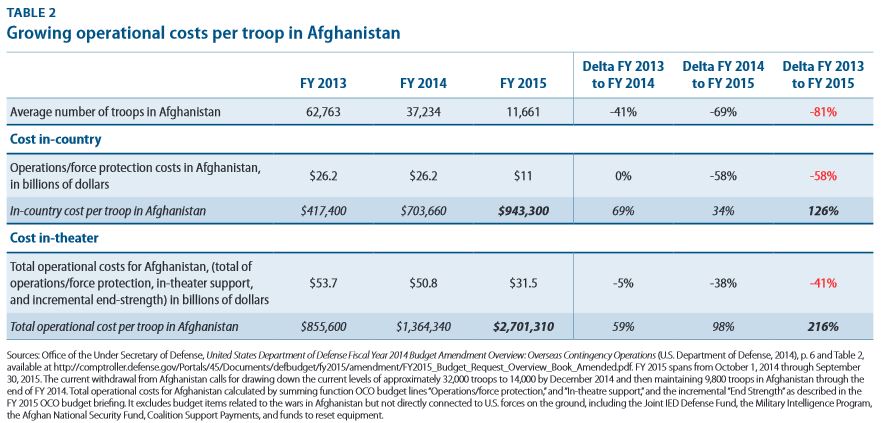CAP Report Warns Against Turning War Spending Into a Slush Fund
The Center for American Progress' Katherine Blakeley and Lawrence Korb recently issued a report recommending how lawmakers should wind down war spending, known as Overseas Contingency Operations (OCO), as U.S. involvement in Afghanistan wanes. OCO has become a headache for budget enforcement because, unlike base defense spending, it is not capped and so it has been used to avoid the discretionary spending caps.
Making matters worse, the continuing resolution funding the government for the first two-and-a-half months of FY 2015 continued OCO spending at last year's levels, $26 billion above the Administration's request (at an annualized rate). Congress should address this issue during the lame duck session by making prudent use of the OCO designation in any government funding bill to limit spending to war needs and codify criteria for use of the OCO designation in the defense authorization bill.

Blakeley and Korb make five main recommendations:
- Keep OCO funds tied to the costs of war
- Stop using OCO funds as a ‘safety valve’ for the base defense budget
- Do not make OCO a permanent emergency fund
- Exercise authorizing and oversight authority for military action
- Have the tough conversations about defense resources and trade-offs
The report emphasizes the need to adhere to budget discipline and not use OCO as a workaround. On the first point, the authors argue that when the Pentagon migrates OCO funds back to the regular defense budget in FY 2016, it should make sure costs related only to Afghanistan are included in future OCO requests. The report criticizes the practice of funding base budget items through OCO and says that doing so will only make it harder for the Pentagon to adjust to funding levels under the spending caps. As an example, they cite the significant uptick in operational costs per troop in Afghanistan between 2013 and the Pentagon's request for 2015. The cost of withdrawing troops does not fully explain the increase, suggesting that some funds are being used for other operations.

Along with other aspects of the FY 2015 war request, this suggests that the Administration and Pentagon hope to use OCO as a permanent source of funding. In particular, the report cites the Counterterrorism Partnerships Fund and the European Reassurance Initiative as egregious examples: neither directly related to the wars nor intended to be temporary. Both are part of the Pentagon's long-term strategy, so they should be funded through the base defense budget. We made the same point earlier this year.
The authors also argue that the increasingly blurred line between OCO and regular defense spending has made smart budgeting more difficult. The over-budgeting in recent years has left unobligated funds of $8.3 billion in the FY 2013 OCO budget and likely greater amounts in FY 2014. The Administration has been able to use the excess funds for various purposes, including the air strikes against ISIS. By clearly over-appropriating funds, Congress has excluded itself from the process of authorizing and explicitly appropriating funds and opened the possibility that OCO could exist as a continuing slush fund. In addition, the unlimited OCO budget has given lawmakers and the Pentagon a false sense of their resources, making it more difficult to take stock of the trade-offs necessary to fit within their budget constraints.
We certainly agree that keeping OCO uncapped and not having a concrete definition of what can qualify for the designation has hindered budget enforcement and smart budgeting. Shifting base budget items to OCO is seemingly commonplace now, and the continued elevated levels of war funding despite scheduled drawdowns has given the Pentagon leeway to pursue policies on its own.
Ideally, Congress would address these issues by putting in place hard caps on war spending. Realistic caps would clarify how much money the Pentagon expects to get each year and shut the backdoor opportunity to increase spending. If lawmakers find these totals unworkable, they could increase the defense spending cap in exchange for mandatory savings as they did in the Bipartisan Budget Act.
Another option, which is especially timely since Congress will need to finish a defense appropriations bill by mid-December, is to codify criteria for what can qualify as OCO. A bipartisan amendment was offered to the House appropriations bill to codify these criteria so that the Pentagon could not use OCO funds for other purposes. Congress and the Defense Department could agree on criteria to be used in the upcoming defense bill and make sure that all future requests adhere to the criteria.
There simply does not need to be a war slush fund continuing long after the wars themselves have ended.


